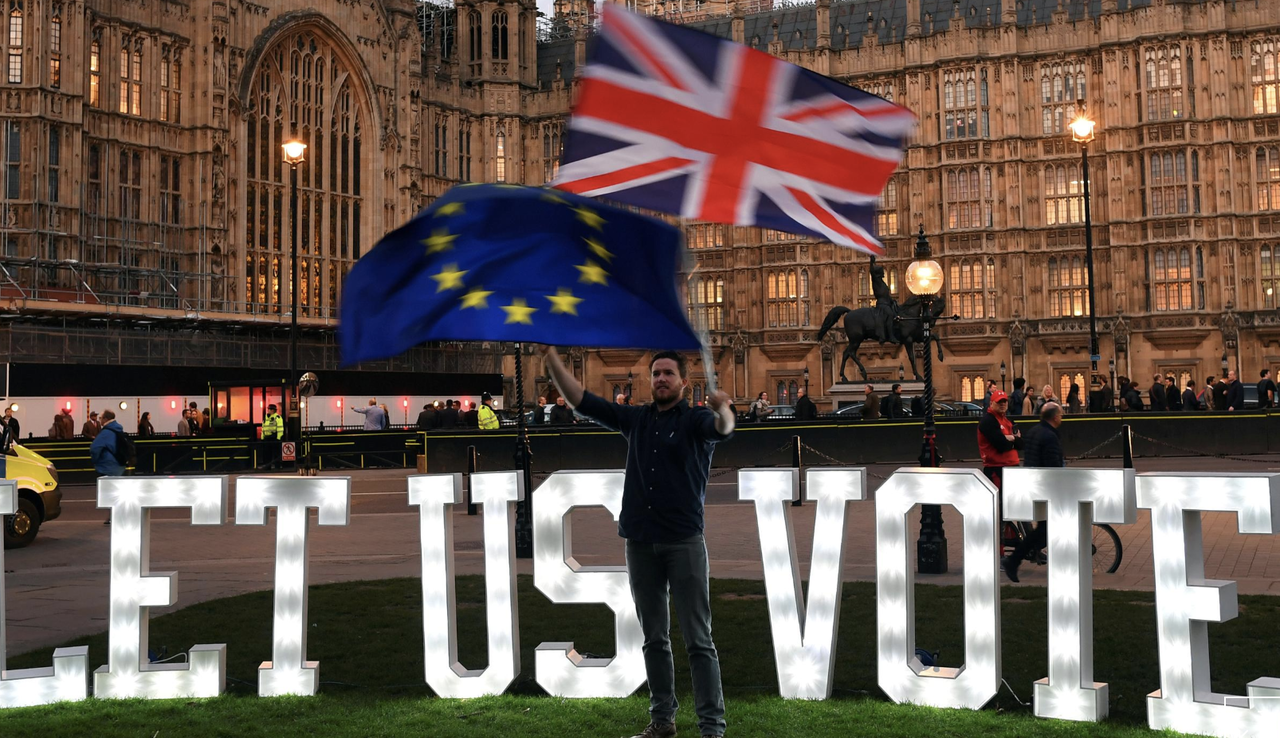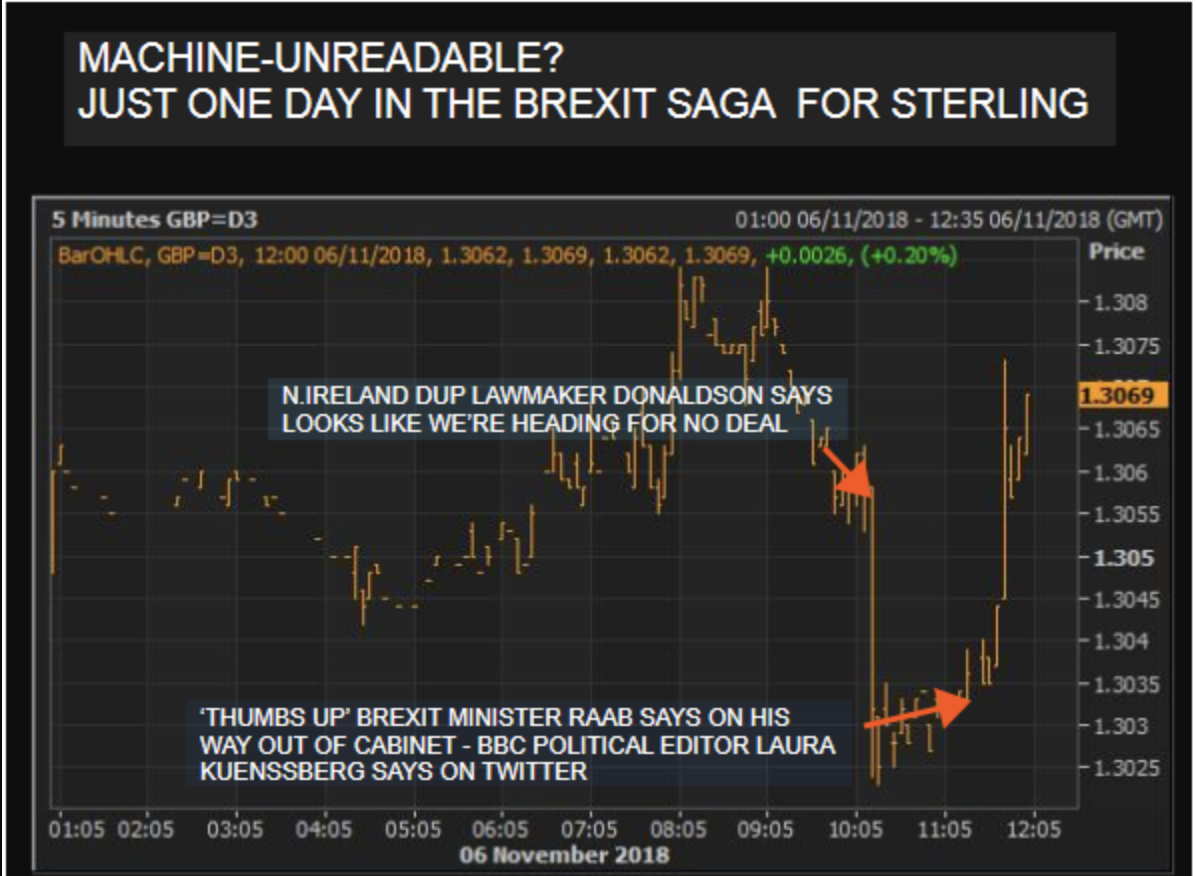Since June 23, 2016, trading the British pound has been fraught with peril for both carbon-based and mechanical counterparts. Though it outperformed most other G10 currencies during Q1 (even as the risk of a disorganized ‘no deal’ Brexit appears to have risen), the currency has shed 13% from its pre-Brexit highs, and traders have had to contend with extreme bouts of intraday volatility, not to mention the occasional flash crash.
But as the Brexit drama has intensified over the past few weeks, with critical votes being held almost every day followed by an endless stream of commentary, speculation and conflicting reports, parsing all of this data has rendered the pound practically untradeable for algos designed to read and react to newswire headlines.
According to Reuters, “as a divided government battles a divided parliament over a way forward, the chorus of characters who can now influence events has grown, flummoxing news-reading algorithms…which are designed to parse phrases from recognized speakers before executing a trade.”
This “blizzard” of Brexit-related headlines has been one of the biggest challenges for algorithmic traders in their short existance. Reuters has pumped out as many as 400 Brexit-related headlines a day in recent weeks, up from just 15 on average before Brexit, while Bloomberg has published as many as 1,000 on particularly busy days, like on March 12, when MPs rejected Theresa May’s withdrawal agreement for the second time.
After Prime Minister Theresa May decided to pursue talks with the opposition, we saw a surge in conflicting Brexit headlines, presumably because the fractious interest groups within the government and the opposition have engaged in a chaotic battle royal to try and wrest control of the narrative. Just look at the news flow since the beginning of the week: news wires have reported that the PM will pursue talks with the opposition, that she might endorse a vote on Brexit-deal alternatives, that she might call for a general election, request a long Brexit delay, request a short Brexit delay, possibly consider another referendum etc. etc. And that’s not even factoring in the reports from Brussels.
While machine learning has made serious strides over the past ten years, trading algos still don’t have the capacity to understand the mechanics of obscure British parliamentary procedures like how Speaker John Bercow was able to declare that May couldn’t bring her withdrawal agreement back for a third vote unless strict conditions had been met.
Courtesy of Reuters
Machines also don’t possess the ability to process visual cues.
On November 6, Britain’s then Brexit Minister Dominic Raab, pushed the pound up simply by giving a “thumbs up” after a cabinet meeting – a visual cue that would outfox machines programmed to analyze words.
Raab’s market-moving gesture came after the pound had fallen on a tweet warning of a no-deal Brexit from Jeffrey Donaldson, one of 10 Democratic Unionist Party lawmakers whose support May needs.
The fact that traditional market drivers like economic data and central bank forecasts have been lost amid this storm of political speculation has compounded the frustration for some quant-driven macro hedge funds (though American equity bears can probably sympathize with this). Some have stopped trading sterling altogether.
Some hedge funds have opted out of trading sterling altogether because the usual models they rely on don’t work in the current climate, according to one FX trader at a major UK investment bank.
Their models are based around economic data and expectations for Bank of England rate changes, but those have become secondary drivers compared with political news, he said.
But the buy side aren’t the only ones struggling thanks to Brexit. Since roughly 70% of trades on some of the most popular FX trading platforms are executed by algorithms, market makers are widening the spread they’re demanding for facilitating trades to compensate for any losses due to volatile trading aggravated by poor liquidity conditions.
That is driving up costs for everybody who trades sterling, either for speculative for commercial purposes
But a wider spread makes it more expensive to deal in pounds. Rob Turner, a quantitative trader at RBC Capital Markets said the average cost of trading, by taking into account the spreads, for sterling in a usual 10 million ticket jumped last week to 2.9 pips from 1.9 pips in October.
“That shows that the price at the very best moment for executing a sterling trade last week was still a lot worse than the worst moment in a normal week,” Turner said.
Meanwhile, most currency dealers that take risk on to their own books are now reluctant to leave the machines unsupervised.
Some banks are ensuring that trading the pound is not left completely to the machines while other banks are using tiny orders within narrow trading ranges to prevent large losses.
“If it was your job and given the complexity of the Brexit story, do you really want to precode something to automatically infer and put material risk on the back of that,” said David Leigh, global head of FX spot and electronic trading at Deutsche Bank.
“Probably not.”
The result has made sterling an outlier. As volatility in G10 FX – and stocks, and bonds – has plunged, for sterling, volatility has surged to its highest level in two years.
And if May and Europe decide to kick the can once again, this pattern will probably persist for the foreseeable future. If this happens, a lot of people will be unhappy, but we could think of two organizations that just might benefit.
One would almost think that Brexit is a giant ploy to boost FX trading revenues for Reuters and Bloomberghttps://t.co/MbA7ouUTPS
— zerohedge (@zerohedge) April 4, 2019
via ZeroHedge News http://bit.ly/2K8CtgO Tyler Durden

